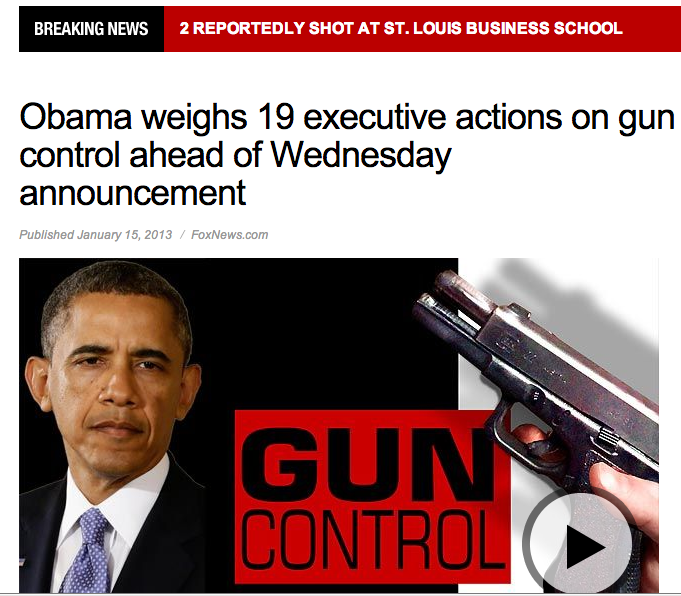By Contrast…
Posted on January 21st, 2013 in Uncategorized | 4 Comments »
A wounded (by humans) dolphin comes to a group of night divers for help. One of the most astonishing underwater videos I’ve ever seen.
A wounded (by humans) dolphin comes to a group of night divers for help. One of the most astonishing underwater videos I’ve ever seen.
I guy I know posted this on Facebook. I’m glad I don’t know him very well.

Police chiefs in New Hampshire are holding a raffle to raise money for a law-enforcement training academy.
What are they giving away to the winners?
Assault rifles….
…gun-rights activists are defending the raffle as a good cause…..
The mind reels.
At a party a couple weeks ago my wife pulled me into a conversation she was having with a guy I didn’t know and said to me, “Quick—what’s the best movie you’ve seen in the past few years?”
That’s easy, I said. Stake Land.
And I meant it: If you haven’t seen it, this apocalyptic vampire/plague film is really, really good. The vampires are absolutely the best I’ve seen in film in a long, long time—pretty impressive given that the film’s budget was about $600k—and they’re not even the scariest thing in the movie. (This review compares Stakeland to Terence Malick.)
So that proved to be the right answer, because the guy my wife was introducing me to was Jim Mickle, the director of Stakeland. Turns out he’s an incredibly nice guy, and it was a blast to be able to tell him what a great movie he made (which presumably he already knew, but still).
He now has a new movie coming out, We Are What We Are, a remake of a Mexican cannibal movie. (Funny that such a nice guy has such dark stuff on the mind, but he’s hardly the first person to embody that paradox.) The buzz is promising.
It’s at Sundance now; look for it in the months to come. And remember the name, Jim Mickle. This guy is very talented.
No trailer yet for We Are What We Are, but here’s the trailer for Stake Land. Trust me—it’s a dark and original American vision. You won’t soon forget it.
In one of those articles that is supposed to make all of us wonder if we are living as productive or glamorous lives as we should be, the New York Times spends a Sunday with Columbia economist Jeffrey Sachs.
It begins with a big wet kiss:
The economist Jeffrey Sachs, 58, is such a citizen of the world — especially the crowded, hungry and malarial parts of the world — that it may be hard to imagine him among the creature comforts of the Upper West Side.
Not that hard, actually, because Columbia pays Sachs an awful lot of money and provides him with a townhouse in the west ’80s—plenty of space between Sachs and the grit of Morningside Heights.
Sachs gets up at 5 AM or earlier every day to answer emails from Europe and Asia. He emails and Skypes for a while, then he reads the paper for an hour. (Good man!) Then he takes a walk with his daughter, making his way through Zabars (on a Sunday morning? huge mistake). In the afternoon he works on his book about JFK’s speeches (sort of an odd topic for an economist, though perhaps an appropriate one for a citizen of the world), then goes out with his family to dinner (Ocean? oh, dear), then goes to the movies—he never watches TV—and then “very often” he “gives a speech at 10:30 or 11:00 at night” for Asian consumption.
If this doesn’t make one feel inadequate….
That is followed by four, maybe five hours of sleep.
I always wonder if people really get by on that little sleep, or if the ability to sleep that little contributes to productivity and accomplishment levels. Or if people are just lying to sound like Davos uberachievers.
I do admire Sachs’ discipline. (And, though I tease, I think Sachs really has his heart in the right place.) Yesterday I got up at 5 AM because, well, my son woke up at 5 AM. We played together for a few hours, during which time I changed a couple diapers of varying contents, and we shared a bowl of Rice Krispies, a relatively recent morning ritual. (The little guy loves them, though about 50% of his mouthfuls wind up on his jammies.)
While consuming about five cups of coffee—I know, it’s a problem—I read several articles in the newspaper, none of which I can remember at present, then paid some bills and cleared up some credit card snafus. (A $95 annual fee? Just to get American Airlines frequent flier miles which you can never actually use. Are you on crack?)
Then I went to meet my wife and son at children’s storytime at Greenlight, the local indie bookstore—quite good!—and picked up some a few things—cilantro, lime, Russett potatoes—for the dinner I was cooking later that night. Back at home, I changed into tennis gear and drove the Tiguan out to the National Tennis Center in Queens; $66 for an hour of court time, which is pretty darn good by New York standards. Alas, I got crushed, but it was still good fun. Returning home, I watched about five hours of football with a couple friends and made a dinner of ribeye, baked potatoes, salad and some awesome cookies from Green Grape, the outrageously priced but very tasty local market. I also fed my son dinner, gave him a bath and rocked him to sleep.
During which time I also worked on my book about George W. Bush’s speeches.
Wait, sorry—that last part isn’t true.
So, no Skyping with Eurobrokers (that’s a word I made up) and no speeches for Asia. All in all, though, not a bad Sunday. (WTF, Patriots?) I await the Times’ call.
The Bronx Zoo had a baby! A baby gibbon. The first primate bred at the zoo since 2000.
It’s pretty damn cute.
The “network” postsed this graphic about the President for a story on his gun control agenda. Good thing Fox viewers aren’t susceptible to the power of suggestion.

Thanks to Wonkette, on which I read about this.
Bobby Kennedy’s son says his father believed the assassination of JFK was a conspiracy, probably involving the Mafia.
The Times had a good piece a couple days ago about how college and university endowments are often opportunities for members of governing bodies to support their private investments—by getting the universities to invest in things they’ve invested in. What happens is that universities put these financiers on their boards because of their perceived investment expertise and their ability to help the university gain access to hard-to-access investments. (I am skeptical that any investment is hard to access these days, but never mind.) Then the board members turn around and recommend the university make investments from which they, the board members, might profit.
Trustees’ connections can prove profitable for the universities, offering access to top-performing hedge funds and private equity firms that may not be open to other investors. But they can also create the appearance that the colleges may have nonfinancial motives for picking investments. And if the investments do not perform well, it can be stickier to fire the money manager.
The Times hangs this piece on Dartmouth, which seems to have a number of potential conflicts. Elsewhere around the Ivy League:
…Brown and Cornell have disclosed five trustee-related investments. Princeton, Yale, Columbia and Pennsylvania have reported just one. Harvard has not reported any trustee investments, but its reports do not include investments managed by firms of board members of Harvard Management, which runs the university’s endowment.
My guess is that this practice is rampant, especially since hedge fund returns have been so miserable the past few years. (Hey, they need new investors from somewhere.) I’ll be curious to see what comes of this.
This is from the epilogue of William Manchester’s remarkable book, The Death of a President—November 1963, which I’ve just finished:
“On the issue of small-arms control the [Warren] report was silent; the commissioners debated among themselves and decided this question lay outside their province. In the wake of the assassination the pressure for such legislation seemed irresistible; a Gallup poll revealed that eight out of ten Americans favored new laws requiring police permits of weapons buyers. Robert Kennedy asked Congress to outlaw the mail-order traffic, supportive mail engulfed the Hill, and in the weeks after the funeral Senator Thomas Dodd of Connecticut introduced a sensible bill to ban mail-order sales, bar weapons from abroad unsuitable for sporting use, forbid sales to people under twenty-one, and require all purchasers to identify themselves so police could later trace them. The American Bar Association endorsed it and was ignored. The Director of the U.S. Bureau of Prisons pointed out that “After all, cars have to be registered and drivers licensed” and was unheard. Indeed, though eighteen such measures were introduced on the Hill, none of the gun laws went off. The United States remained the only modern nation in the world without firm regulation of the sale and use of firearms—Oswald couldn’t have assassinated Kruschev in Russia—and in 1964 some 600, 000 cheap firearms were brought into the country.
“A great many seemed to regard all proposals for tighter controls as a challenge to their virility….”